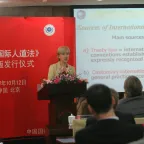Geneva Conventions (Consolidation) Act – Model law
Legislation for Common Law States on the 1949 Geneva Conventions and their 1977 and 2005 Additional Protocols ADVISORY SERVICE ON INTERNATIONAL HUMANITARIAN LAW ____________________________________ …


